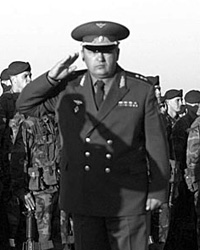Government of National Unity
The Government of National Unity (Ellik Birliği Ükimät-Keņesi, abbreviated to EBÜK) was the ruling body of Turkestan between 1948 and 1990. It was a pro-SNOR regime installed by the Russian ruling party following the end of Chinese hegemony over the country, and for the most part slavishly followed the lead of the main SNORist regime in Russia.
Establishment of the Regime
Unlike the SNORist parties of Russia, Ukraine and other Slavic-majority nations, there were very few Russians or Slavs of any kind in Turkestan. The typical SNORist response in such cases was to place some other minority in charge, one that would be dependent on Russian backing to remain in power (and therefore compliant), but large enough to rule the country without requiring a continuous large troop presence to quell dissent.
In other circumstances, either the Tajiks or the Qazaqs might have been put in charge, being the only minorities large enough to be effective. The Tajiks were a sizeable minority, were city-dwellers, many of them were even Christians, albeit of the Assyrian branch of the faith, and they were just different enough from the majority of the country to seem promising. However, the Tajiks, being a Persian people speaking a language very close to the Dari Farsi of Persia, were perceived as being too liable to lean on an unpredictable foreign state (ie Persia) rather than on the Empire.
The Qazaqs were nomads – a group looked down on by the settled majority – and were numerous enough to make effective rulers. But the Qazaqs, too, brought their own set of political problems: the partition of Qazaqstan had left around half the total population of Qazaqs under direct Russian rule, and the last thing the White Council wanted to do was put any kind of Qazaqs in charge of any kind of foreign state, not even if Turkestan were the most docile satellite state one could wish for.
The Russians looked elsewhere. Each of the three largest religious groups had their own set of potential problems for Mother Russia. The Muslims were likely to seek greater connection with the rest of the Islamic 'umma rather than closer ties with the Empire. The Zoroastrians were likely to turn to Persia. And the Assyrians were just trouble: they could not be relied upon to do as they were told, but were likely to chart their own course regardless of political pressure placed on them.
This left the smaller religious communities, of which the Manesians were the most numerous. They were only about 10% of the population, but had the distinct advantage of having no real presence outside of Turkestan and Uyguristan, therefore no natural allies abroad to lean towards.
The Russian liberation forces therefore, according to instructions received from the White Council, installed Manesians into many of the positions of power in the new government.
Character of the Regime
The EBÜK government's ideology was, on the surface, fairly similar to that emerging in the Qurultaı period. However, whereas the Qurultaı government celebrated diversity within the framework of their common identity as Turkestanis, in the EBÜK period the notion of different national identities was suppressed, sometimes brutally. Commonality of origin as Turkestanis was emphasised, and the idea that "Sart, Nomad, Tajik – we are all one people", to quote a slogan of the period, was used as a unifying ideal.
The notion of a political party was a foreign one at the beginning of the EBÜK regime; the government itself took on aspects of a party, and as with many SNORist states, the division between state and party became blurred; this happened all the more in Turkestan due to the absence of any parties before the takeover.
Even compared to other SNORist states, the secret police of the Department of Homeland Security were everywhere; both those of the uniformed Homeland Security Force and especially the others. Tajiks were numerous in the upper echelons of the VAB (Vatan Amanlığı Bölimi; "Homeland Security Division"), but by all means not all of them were Tajiks. And not all Tajiks were members, either, though it paid to be extra vigilant about what you said around those of that ethnicity.
The Russian liberating forces mistrusted the chaotic, unpredictable nature of the Qurultaı government, and the institution was disbanded. Toothless "Provincial Qurultaıs" were allowed in the six provinces after their establishment in 1950, but all of the real power was in the hands of the new Keņes. Despite this, anyone attending a provincial Qurultai was watched carefully, especially if they were young. In the Keņes administration, Party officials appointed the local leaders, as opposed to the functioning of the Qurultaı where established local leaders came together to discuss issues. Opposition to the Government's ideas was crushed swiftly and without mercy; if you were working against the Government of National Unity, it was reasoned, you were working against the national unity itself, which was treason.
Leadership of the Keņes
The overall leadership of the government was another area where the Russian liberating forces made large changes. In the Qurultaı, there was no continuing overall leadership, apart from that arising from the personal charisma and skills of individuals. Whoever was hosting the Qurultaı assembly would chair the meetings, and as this rotated among the different local leaders from year to year, the result was an ever-changing head of state.
Jalan Ilxan
The EBÜK regime changed all that, installing a permanent Head of the Keņes. The first of these was Jalan Quyrat-ulı, a Qaraqalpaq Manesian Elect who quickly established himself as sole autocrat of the nation, reviving the ancient title of Ilxan (Il-Khan) and bestowing it upon himself. In an ironic twist, Il-Khan originally meant "Subordinate Khan"; Jalan Ilxan was anything but. He created the massive Department of Homeland Security apparatus and occasionally forcibly removed or outright killed members of his inner Keņes in violent loyalty purges. This became a feature of Snorist Turkestani politics, together with the bloody power struggles that occurred on the death of an incumbent. His successors kept the title of Ilxan and it continues to this day, albeit with dramatic modification.
On his death there were violent and protracted power struggles, but eventually Mızar Aman Beğ-ulı succeeded to the Ilxanate.


